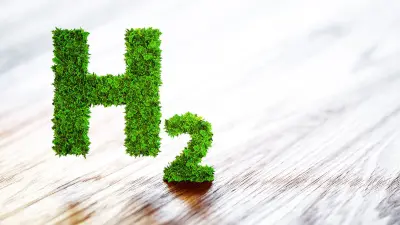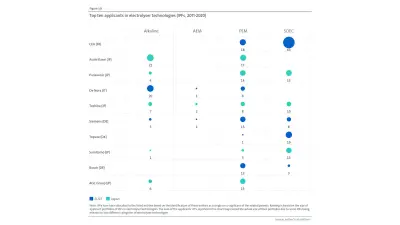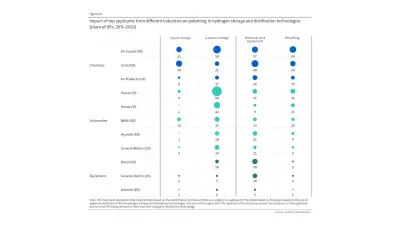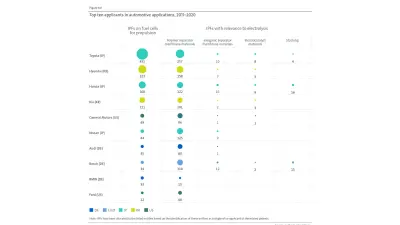Bosch as a powerhouse of the hydrogen economy
Germany leads Europe in hydrogen innovations. Bosch and Bosch Research are important drivers of this development.

A new joint study by the European Patent Office (EPA) and the International Energy Agency (IEA) regarding patents in the field of hydrogen technologies reveals that German companies and research institutions are the leaders when it comes to hydrogen patents in Europe. The study identifies significant technology leads in patent applications from Germany in the areas of storage, distribution and conversion and end-use applications for the period from 2011 to 2020.
Worldwide, Bosch ranks 11th among hydrogen innovators in the study. In terms of impact by industry on patent applications for the storage and distribution of hydrogen, Bosch is in first place within the supplier industry. In the ranking for automotive applications, Bosch is in eighth place as the only supplier alongside nine automotive OEMs.
Bosch Research is doing pioneering work in all of the areas mentioned, the results of which are brought to market maturity in close cooperation with the Bosch divisions. The EPA study was based on worldwide patent family filings for hydrogen innovations from 2011 to 2020.
Bosch is particularly strong in the research and development of mobile fuel cell systems and components as well as stationary high-temperature fuel cells for power generation. The resulting technologies form the basis for developing electrolysis systems for producing hydrogen. Both of these areas have their origins in Bosch Research. Bosch Research has been researching mobile fuel cells since the 1990s and solid oxide fuel cells since 2004.

“I am delighted to see Bosch’s excellent performance in terms of hydrogen innovations on an international level. Bosch Research plays an important role here: Our many years of basic research and advance development of fuel cell technologies are increasingly being brought to market maturity in Bosch's business divisions. This benefits us, our customers and the climate," said Peter Wolfangel, member of the board of management for the central Research and Advance Engineering department at Robert Bosch GmbH. “And it helps us to stay on the cutting edge in this core area of climate protection.”
In the research and development of mobile fuel cell systems, Bosch Research is working on all the central components — from the core, the stack, to the air compressor and the control unit. One key area of research here: An optimized design and operating strategy, taking into account the wide-ranging system interactions. One of the major challenges is to design the fuel cell units to be as space-saving and flexible as possible, thus creating the basis for various future applications and further technological developments. Another key area of research is the fuel cell itself. The focus here is on research into new, futuristic materials to maximize the performance and service life of fuel cells.
In addition to mobile fuel cells, Bosch Research is working on the production of hydrogen by means of electrolysis — and has been doing so for more than ten years now. In 2012, Bosch Research began research and advance development of electrolysis systems; collaborations with external partners on publicly funded projects soon followed. The knowledge gained is an important building block for Bosch's rapid entry into the manufacture of core components for electrolysers, which will make a significant contribution to so-called green hydrogen. With the help of electricity generated from renewables, electrolysis systems split water into hydrogen and oxygen. Bound in the form of hydrogen, the climate-neutral energy can be stored for long periods of time. Bosch Research supports the division during series development and is already researching the next generation of electrolysis systems.
For the stationary, decentralized and climate-friendly power supply of urban quarters, buildings, industrial plants and data centers, Bosch relies on SOFC (Solid Oxide Fuel Cell) systems. If, in addition to the electrical efficiency, the waste heat from the high-temperature fuel cells is also used, for example as heating energy, they achieve a system efficiency of over 85 percent. The systems are currently being trialled in a number of pilot projects.


